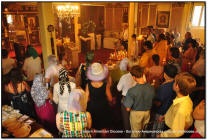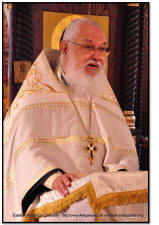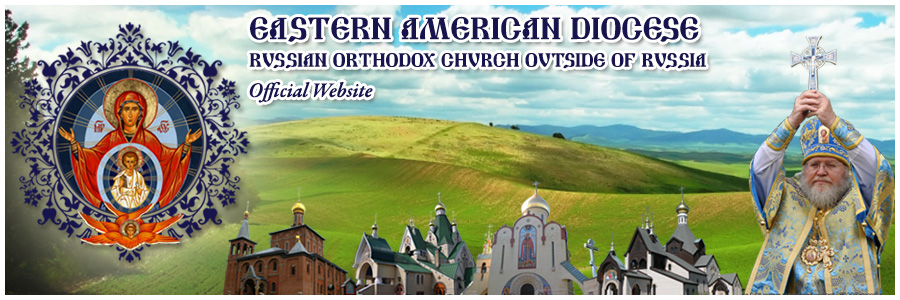Русская
Версия

 July
24, 2011
July
24, 2011
Jackson, NJ: Memorial services were held in St. Vladimir Memorial
Church on the 40th day of the repose of Archpriest Philip
Petrovsky
On Sunday, July 24, on the feast of Holy Grand Princess Olga,
Equal-of-the-Apostles, the 40th day of the repose of Archpriest
Philip Petrovsky was marked at
St.
Vladimir Memorial Church in Jackson, NJ. Deputy rector Priest
Serge Ledkovsky celebrated the Divine Liturgy in the lower Holy
Virgin Protection Church, co-served by parish Deacons Alexander
Smida and Paul Drozdowski. After the Liturgy, a panihida was served
for Fr. Philip.

In honor of the 40th day of the repose of Archpriest Philip
Petrovsky, we would like to offer our readers the eulogy of New
Jersey Dean Protopresbyter Valery Lukianov, delivered at
Fr.
Philip's funeral in the lower Holy Virgin Protection Church at
St. Vladimir Memorial Church in Jackson, NJ on June 17, 2011. Memory
eternal and eternal rest to Fr. Philip!
 In
the name of the Father, and of the Son, and of the Holy Spirit!
In
the name of the Father, and of the Son, and of the Holy Spirit!
Members of the Church Abroad predominantly settled in the Diaspora
after living in various countries of the world. Even today, the new
wave of immigrants represents a well-travelled group of people. Many
constituents were born in the new lands, yet preserved their native
faith and ethnic history. One such family, the Petrovskys, settled
in New
Jersey early
in the 20th century, raising and educating their children
in the new country. Our newly deceased Archpriest Philip, born in
Brooklyn, spent his whole life in the Cassville-Jackson region since
his early childhood, and is thus a representative of the native core
of this town. The family cherished its Russian culture and, with it,
united itself intimately with the Russian Orthodox Church. The
result of this upbringing is for all to see in the person of the son
Philip, who became a priest of the Church. Of course, this did not
come about suddenly. The young man became engaged in church work,
gradually moving on to involvement in organizational challenges. By
the age of 30, he decided to completely change his life, putting on
the cloak of a cleric and becoming a true servant of the Lord.
This turnover came about through the stewardship of Archbishop
Nikon, a kind and gentle man, who received everyone in loving
embrace, and is well remembered – and he is here among us now in
this resting place. Vladyka Nikon saw in the youngster what was
necessary for him to serve the Lord, and as a result, 35 years ago,
ordained Philip to the Diaconate. And ever since then, Fr. Philip
has always cherished in his heart a close relationship and love for
his hierarch, as many of us did. To most of us who are from this
area, Vladyka Nikon was for many years a beacon.
A year later, Deacon Philip was ordained a priest at the hands of
the most-pious and wise Metropolitan Philaret; and thus, he started
on his path of service in the Lord’s vineyard. Now, we know from the
Gospel of St. Matthew that there is an established foundation of how
a priest is supposed to live his calling. It’s very simple, and yet
profound: namely, that the priest has four ministries to perform in
his lifetime. Of course, the basic one is church worship; that is,
performing the services and the sacraments and rites of the Church.
The second one is teaching and bringing people to the Christian
faith: "Go and teach all nations, baptizing them in the name of the
Father, and of the Son, and of the Holy Spirit." The third one is
caring for souls
–
душепопеченіе
in Russian. And, finally, in his own life, leading the pious life as
a pastor.
Let us look at these phases of this priest’s life. We came here not
just to bid farewell, nor to perform a service – we came here for a
lesson, to learn what someone has achieved, and what we have yet to
achieve. For 35 years, Fr. Philip served as no other priest did: in
many parishes (in 1999 he counted 17 such assignments), substituting
for priests who were sick or had to go away. From Lakewood to
Howell, to all regions of Jersey and neighboring states, Fr. Philip
was always there, performing the services of our Lord.
It so happened through the Providence of Our Lord, that towards the
end of Fr. Philip’s life, God put him in a position right here, so
that he would serve Him here in this church. He loved this church,
and he wanted to build something here. He wanted to develop this
into a cozy place, where people coming throughout this whole area –
the cemetery and all around – would have a place to rest, and to
pray at the remains of Archbishops Vitaly and Nikon.
"Go and teach all nations!" Yes, for 35 years, Fr. Philip taught the
Law of God to people who were hungry. But he was not satisfied with
that schedule of teaching. He decided on a very small scale to try
to be a missionary and bring the Word of God to the American people,
who oft times, because of the language barrier, are unable to
encompass all of the beauty of the services of the Orthodox Church.
So, he started his road as a pilgrim, a missionary. Not in any big
way, but in humility. Not in anything spectacular, but gentle and
simple. And, thus, the little mission started, and over time it has
grown.
Care for souls:
душепопеченіе.
Fr. Philip was not a man of the book. He was a man of practical
wisdom. This, of course, we can all confirm from our relationship
and experience with him. He had a certain wisdom, an earthly and yet
spiritual wisdom combined. A lot of times you get counsel from a
priest, and it’s completely earthly, and it pushes people away. On
the other hand, you could find a priest who gives counsel that’s
completely spiritual, as do monks, and again this person would find
it impossible to follow, and walk away. Fr. Philip had just the
right balance of the two: he was able to provide his practical
wisdom in caring for the people and give the right counsel to scores
of the faithful who were seeking his advice.
And the fourth imitation of Our Lord in a priest’s life is, of
course, a pious pastoral life. I’m sure that we don’t have to say
much about this particular aspect, because before our eyes lies a
man who was humble, who was simple – he didn’t care for the fanfare
– those things that do so much harm, nurturing pride and
competition. He tried to stay away from church politics, away from
the bustle, and as a result you see what is happening today: in this
little church, surrounded by his brothers and his fathers, our
bishops, surrounded by all of you who loved him in this little
church that he loved so much, we are gathered in simplicity and
brotherly love. And if we had here a big mansion with a multitude of
clergy attending and two big choirs, it wouldn’t have done as much
homage or service to him, because this was his way of life, and this
was what he would have enjoyed. This is what the family wanted, and
I think that in the long run, this is what we all cherish and now
recognize that this exactly fit Fr. Philip as he was.
Yesterday at the panihida, we mentioned that the
aer that’s put on the
priest’s face has two symbolisms. The first is that this was the
aer with which he would
perform the Sacrament of Eucharist, and which would cover the Holy
Gifts during the Liturgy. The second reason for covering the
deceased priest’s face is to symbolize the hope that his soul will
be worthy to view the bliss of Heaven. He would then veil his face,
imitating the angels who veil their visages in perceiving the
eternal glory of the Almighty, as they sing the triumph of God.
As I had said in the beginning, today is a lesson for all of us. And
let us all heed it, let us all take advantage of it, and let us also
remember father in our prayers, and care for this church, which he
loved so much, so that this mission might not die, but might
progress into large dimensions. We especially ask today that we do
not forget the family. Sometimes, after big funerals, the family is
left alone to cry their hearts out. We should be there to offer them
our comforting shoulder. In a worldly sense, we are mourning, we are
crying, but in the spiritual sense, today is a day of glory! Today
is a day of gratitude! Indeed, we are grateful to have known such a
servant of God as Fr. Philip, who was able to leave a heritage of
his spiritual endeavor. We hope and pray that indeed the soul of our
dear Fr. Philip will be for us unto an example for many, many years
to come.
Amen.
Media
Office of the Eastern American Diocese

